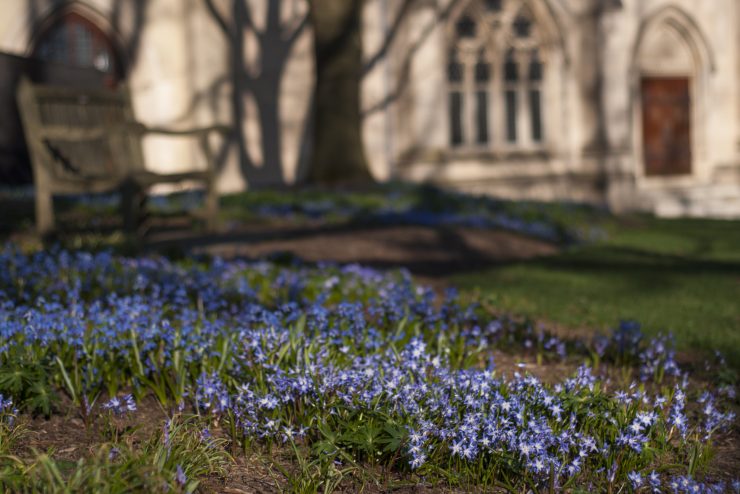God is present through you and me

Psalm 46
God is our refuge and strength, a very present help in trouble.
Therefore we will not fear, though the earth should change, though the mountains shake in the heart of the sea;
though its waters roar and foam, though the mountains tremble with its tumult.
There is a river whose streams make glad the city of God, the holy habitation of the Most High.
God is in the midst of the city; it shall not be moved; God will help it when the morning dawns.
The nations are in an uproar, the kingdoms totter; he utters his voice, the earth melts.
The Lord of hosts is with us; the God of Jacob is our refuge.
Come, behold the works of the Lord; see what desolations he has brought on the earth.
He makes wars cease to the end of the earth; he breaks the bow, and shatters the spear; he burns the shields with fire.
“Be still, and know that I am God! I am exalted among the nations, I am exalted in the earth.”
The Lord of hosts is with us; the God of Jacob is our refuge.
Psalm 46 is unquestionably one of my favorite psalms, and it is my “go to” psalm when I need reassurance that God is always near and a “very present help in trouble.” As a priest, I am frequently asked, Where is God in the midst of suffering? It’s a great question without an easy answer.
The Book of Job explores that tough question and in Job we’re looking at the wisdom tradition of retributive justice which asserts that the righteous will prosper and the wicked perish. We know that’s not true from our own experience, and the book of Job tries to explicate how this can happen. If God’s good and God’s just, and God’s powerful, what’s wrong with this picture? You’ll recall that Job was righteous, but every form of malady besets him.
In Rabbi Kushner’s book When Bad Things Happen to Good People, he explores the Book of Job and holds three tenets in tension. One, God is just. Two, God is powerful. Three, Job is righteous. Those three things can’t simultaneously be happening in the wisdom tradition.
What Kushner’s book doesn’t explore is yet another alternative, which is Job is righteous, God is just, but perhaps God is powerful in a way that we don’t imagine. Perhaps God doesn’t exercise power to reach in and rescue, or to reward or punish. Perhaps God has us in the world vulnerable, in need of one another. I think that if we consider our faith as an expression of God’s incredible love for us in the life and revelation of God in Christ, we realize that God is with us even when we suffer.
I’d like to posit the view that we see God in the midst of suffering in one another. The love and compassion of Christ dwells within each one of us and calls us to reach out to those who are hurting.
So back to the original question: Where is God in the midst of suffering? I think God is present through you and me. At the end of Psalm 46, the psalmist writes, “Be still and know that I am God.” God is with us always, as near as our next breath, yesterday, today, and forever.
Blessings and in faith, Jan+
prayer
Tuesday in the Fourth Week in Lent
O God, with you is the well of life, and in your light we see light: Quench our thirst with living water, and flood our darkened minds with heavenly light; through Jesus Christ our Lord, who lives and reigns with you and the Holy Spirit, one God, for ever and ever. Amen.
(Lesser Feasts and Fasts, Fourth Edition, page 43)
Daily Lenten meditations each have a companion morning prayer video offered by the same clergy. View the YouTube playlist to find this meditation’s companion video, or to watch others.